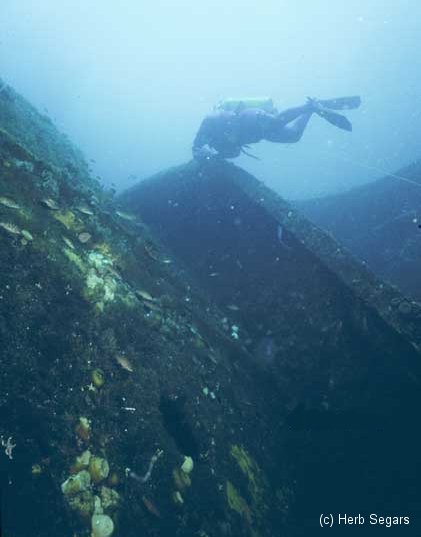Scuba Gear & Training
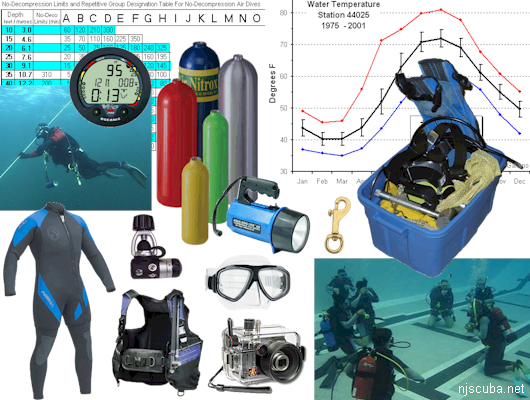
- Home ...
- Dive Sites ...
- Artificial Reefs ...
- Marine Biology ...
More important than gear is training, and more important than training is experience. You can buy gear and training, but there is only one way to get experience.
In aviation there is a saying: "You start out with a full bag of luck, and an empty bag of experience. The trick is to fill up the bag of experience before the bag of luck runs out." The same is true for diving. Take it slow. As one of my instructors said: "There are old divers, and there are bold divers, but there are no old bold divers."
When you start out in this sport, buying your first set of dive gear can be bewildering, not to mention expensive. The sad truth is that as a newly-certified diver, the equipment you have seen and used so far is not what you should be buying for real-world use. Almost all of it - jacket-style BC, weight belt, light, snorkel, etc - is more suited to floating students in a swimming pool or quarry than real-world diving. Most scuba gear is designed for the mass market of easy, infrequent, warm water diving, and is inadequate and/or inappropriate for diving around here. With so many different models and variations of everything - how do you select the best equipment for you? In the absence of any other guide, your first impulse may be to go out and buy just the same gear you were trained in - which is almost certainly an expensive mistake.
- Gear Contents ...
- Dive Training ...
- Dive Gear ...
- Diving Activities ...
- Gas Calculators
- DPlan ...
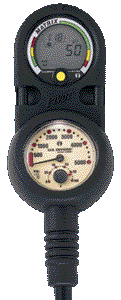
Of the glossy dive magazines, only Scuba Diving ( formerly Rodale's ) has an honest and useful gear buyer's guide. Rodale's will actually call a spade a spade. But even then, it too is aimed at the warm water diver, and misses the mark for New Jersey. Beware of the other dive magazines - they are more interested in maximizing advertising revenues than telling the truth, and will rarely give a bad review to anything, no matter how awful it might be. My experience is that if you find a favorable review and full-page ad by the same manufacturer in the same magazine, you can write-off whatever the reviewer says as tainted - it was bought and paid for in advance.
Don't be oversold on glitz, styling, and questionable "cutting edge" technology. Dive gear has been around for a long time, over fifty years, and has undergone a great deal of evolution and refinement in that time. The latest and greatest innovations are seldom really improvements over tried and true configurations, and are often inferior. Sometimes the things that work best are decidedly low-tech, and often inexpensive and even home-made. And of course, you won't read about any of this in the magazines.
So where can you find out about this stuff ? Probably the best source is your own observation. Before you buy your own gear, go out on a few trips using rental equipment from your local shop. Make sure all the people on the trip are not beginners like yourself ! First of all, you will get to try out the rental gear, and second and more important, you will get to see what real divers actually use. When out on a dive with other more experienced divers, actively check out their gear. Ask them about it - most people are happy to answer questions, and even demonstrate things. On one trip, you can see more equipment than in a dozen dive shops, and get honest real-world evaluations to boot. On a dive boat, pay extra attention to the crew - they dive more than anybody, and can be a great source of advice and information.
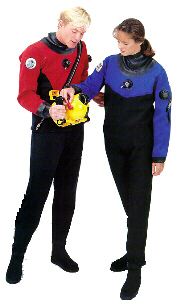
Your local dive shop can also be a good source of information, but beware, although most dive shop sales people are knowledgeable, honest and forthright, like any retailer they also have an awfully strong motive to sell you what they have in stock, rather that what might best suit your needs. I don't know how many times I've heard that the only item in stock is perfect for me. My strong advice here is shop around, not so much for price as for selection.
Ironically, your instructor's kit is probably not a good choice to model your own equipment after. Apart from his close sales association with the shop, many instructors deliberately use the same beginner equipment and even rental gear as their students, for demonstrative purposes. Most instructors dive only infrequently outside the pool and quarry, and even fewer are actually active in local diving. At the other extreme, I have also seen instructors that carry a frightening load of technical gear into the shallow end of the pool - equipment that a beginning diver would neither want, nor need, nor even likely understand.
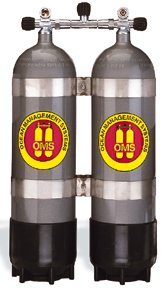
For a beginner, any guide is better than none, and that is who this is primarily aimed at. I have prioritized the list in more or less in the order of importance that I think these items should be considered. I have also added some general ideas, and a few small things, some of which you can even make yourself. Please note that whenever I mention my own gear, it is for purposes of exposition, and not simply vanity. The purpose here is just to suggest some of the factors you should consider as you make your own decisions, and not to tell anyone what particular items they ought to use. You can find links to many of the manufacturer's own websites and on-line catalogs in the Directory section.
Please note that the recommendations made here are strictly for "sport diving" - depths of 130 ft or less, water temperatures above 40°F, with no major decompression. Technical and/or cave diving are extreme forms of the sport that should be undertaken only by qualified and experienced divers, who don't need anyone else's guide to equipment anyway.
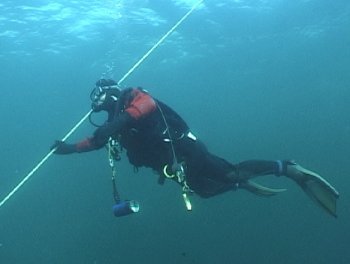
Since all dive gear is made of plastics, steels, brass and aluminum, you might find the entries on those materials in the Artifacts area interesting as well. Also, the listing of specific gravities of many materials, the factor that affects buoyancy.
It seems a lot of warm-water divers are reading these pages too. While much of the cold-water gear described here works well in the tropics, some of the recommendations should be modified for warm water. For example, a massive cold-water wetsuit or drysuit would be inappropriate for Florida or Mexico, but a grit-proof sealed cold-water regulator would certainly not be.
A note on mail-order dive gear:
In a published review of mail-order house-brand regulators, not one was found to be acceptable in performance, and several were deemed to be outright dangerous. A review of mail order house-brand BCs found similar results. This does not mean that major-brand gear purchased through the mail is not exactly the same as what you buy over the counter, just that some mail-order outfits have their own brands that are markedly inferior. In addition, any mail-order house-brand regulator that you buy will most likely have to be serviced through the mail as well, and turn-around time for that could certainly become an issue.
Like gray-market cameras, some mail-ordered equipment does not come with a manufacturer's warranty, something that you should weigh against the cost savings. You should also consider that some diving equipment ( wetsuit, fins, etc. ) really ought to be custom sized and fitted, and unless you are sure of your size, as well as what you are getting, you should probably go to your local dive shop for these items.
On the other hand, many items do not need to be fitted, like tanks, regulators, lights, reels, knives, spear guns, cameras, bags, etc. and can be much cheaper through the mail. The above-mentioned warranties are often of little value anyway. Many mail-order outfits offer a much wider selection than your local dive shop as well. Before ordering, make certain that the item is actually in stock and will be promptly shipped.
Finally, don't forget to support your local dive shop. Who do you turn to for quick repairs, rentals, fittings, air fills, advice, training, travel arrangements, and many other services that a mail-order outfit could never supply? Their sometimes higher prices merely reflect their higher overhead, and if you insist on saving that last dollar until your local shop goes out of business, in the long run you've just screwed yourself.
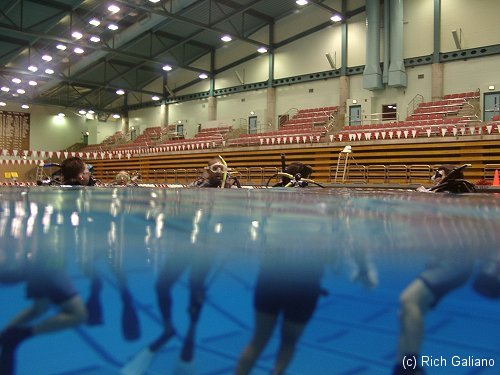
Not a diver yet ? See the section on Dive Training to get an idea what is involved.

